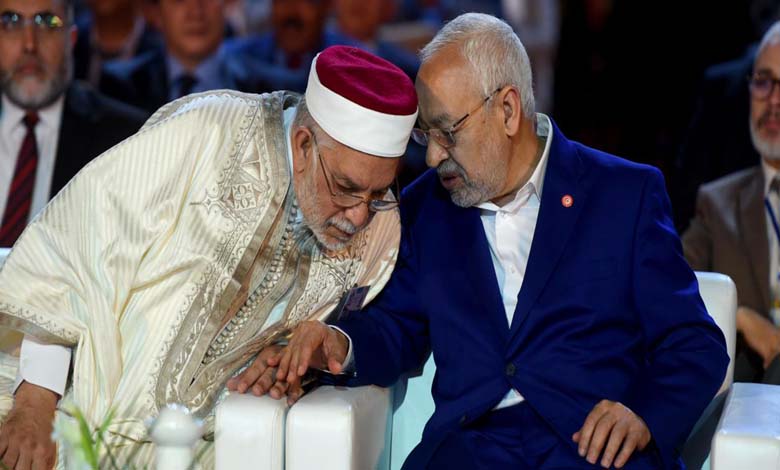Tunisia’s Muslim Brotherhood and the Takeover of Tribune: A New Compass for a Struggling Movement

As the final chapters of the Muslim Brotherhood in Tunisia close under the weight of court trials and dwindling public support, the organization is repositioning itself outside the North African country, seeking a new media platform to revive its vision and reshape the ideological trajectory of its project.
With its traditional platforms under pressure, the Brotherhood has returned to a strategy of “soft infiltration”—this time through Britain’s left-wing media—following the acquisition of one of the UK’s most iconic socialist magazines by a businessman linked to the Brotherhood and wanted on terrorism charges.
-
Rached Ghannouchi Rejects Remote Trial Appearance: Conspiracy 2 Case Shakes the Muslim Brotherhood in Tunisia
-
As the election date approaches… Muslim Brotherhood in Tunisia intensifies efforts to disrupt
What Happened?
Mohamed Ali Harrath, chairman of E-Media Group, which owns Islam Channel (aligned with the Muslim Brotherhood), acquired the historic Tribune magazine, once edited by George Orwell.
Traditionally, Tribune was a flagship publication of the British labour movement. Orwell served as its literary editor, and it published works by prominent authors such as H.G. Wells and George Bernard Shaw, according to The Telegraph.
In 2023, UK’s media regulator Ofcom fined Islam Channel £40,000 for broadcasting content deemed anti-Semitic and highly offensive. The channel is currently managed by Harrath’s son, who serves as CEO.
-
Who is Noureddine Bhiri, the mastermind of the Muslim Brotherhood in Tunisia, accused in the travel case after being sentenced?
-
Saied is determined to eliminate the Muslim Brotherhood in Tunisia… Details
Harrath will now assume the position of chairman of Tribune, where Labour MP Jon Trickett serves as editorial advisor.
Commenting on the takeover, Harrath said: “Tribune’s new future should excite anyone who wants real change and a better, brighter future for all.”
A Leftist Shift?
Islam Channel announced the acquisition, claiming that the new ownership would carry on “a proud tradition of anti-fascism, anti-imperialism, and advocacy for peace and equality.”
-
The Ennahdha Movement collapses… Crises hit the Muslim Brotherhood in Tunisia
-
Its effects are no less than bombing Palestinian hospitals… Saied speaks about the corruption of the Brotherhood in Tunisia
The magazine plans to increase its publication frequency and broaden its editorial mission, according to a statement on its website.
This move follows prior sanctions by Ofcom, which criticized Islam Channel for airing the documentary The Andinia Plan, a conspiracy theory alleging that Jews were planning to establish a state in South America.
Ofcom concluded that the theme of “global Jewish conspiracy” incites, promotes, and justifies hatred based on anti-Semitism and anti-Israel sentiment, including in the UK.
-
Painful end for the Brotherhood in Tunisia… demands to dissolve Ennahdha movement after the arrest of Ghannouchi
-
After the failure of the Brotherhood in Tunisia.. Is Kais Saied ending the legacy of Ennahdha and its corruption?
The channel was also the subject of a complaint by Dr. Taj Hargey, Director of the Oxford Institute for British Islam, who accused it of portraying Islam as besieged by the oppressive West and portraying Hamas, Iran, and other “terrorist groups” as legitimate resistance movements against Western democracies.
Ofcom stated it was evaluating the complaints but had not yet decided whether to launch a formal investigation.
In an April statement, Islam Channel denied the allegations, stating it had been “under sustained attack for many years from segments of the British media.”
-
Tunisia’s Muslim Brotherhood Entrenched in Rumors: A Blade Without an Edge
-
Tunisia’s Muslim Brotherhood Pursues Internal Destabilization: What’s New?
Who is Mohamed Ali Harrath?
- 1995: Arrived in the UK
- 2000: Granted refugee status after fleeing Tunisia
- 2004: Founded Islam Channel and became its CEO
- 2010: Arrested in South Africa on terrorism charges following an Interpol red notice
Harrath founded the Tunisian Islamic Front in 1986, describing it as a “non-violent political party” aimed at opposing Tunisia’s one-party state through peaceful means.
-
Tunisia’s Muslim Brotherhood and the Recruited Fighters Case: Verdicts Close a Dark Chapter
-
Conspiracy Deepens the Wounds of Tunisia’s Muslim Brotherhood: Leaders in Prison and Disillusioned Base
He was convicted in absentia by Tunisian courts for multiple criminal and terrorist offenses and sentenced to 56 years in prison. Charges included “belonging to an unlicensed political party,” distributing leaflets, and holding unauthorized meetings.
In 1988, Harrath became head of the Tunisian Islamic Front, which was later designated as a “global terrorist organization” by the U.S. State Department.
The movement, heavily influenced by Egypt’s Muslim Brotherhood under Hassan al-Banna, was led in Tunisia by Khatib Idrissi, based in Sidi Bouzid.
-
The Tunisian Brotherhood and the Blood of Brahmi… “The Wolf’s Cloak” Does Not Absolve the Sin
-
Reform without the Muslim Brotherhood: A Tunisian Politician Outlines the Path to Unity
-
“Death Under Torture” Case: Tunisia Refuses to Release the ‘Mastermind’ of the Muslim Brotherhood
-
Tunisian President Attacks the Muslim Brotherhood: “Their Illusions Will Never Become Reality”
-
The Tunisian Muslim Brotherhood and the Assassination of Belaïd… A Fragmented Narrative












